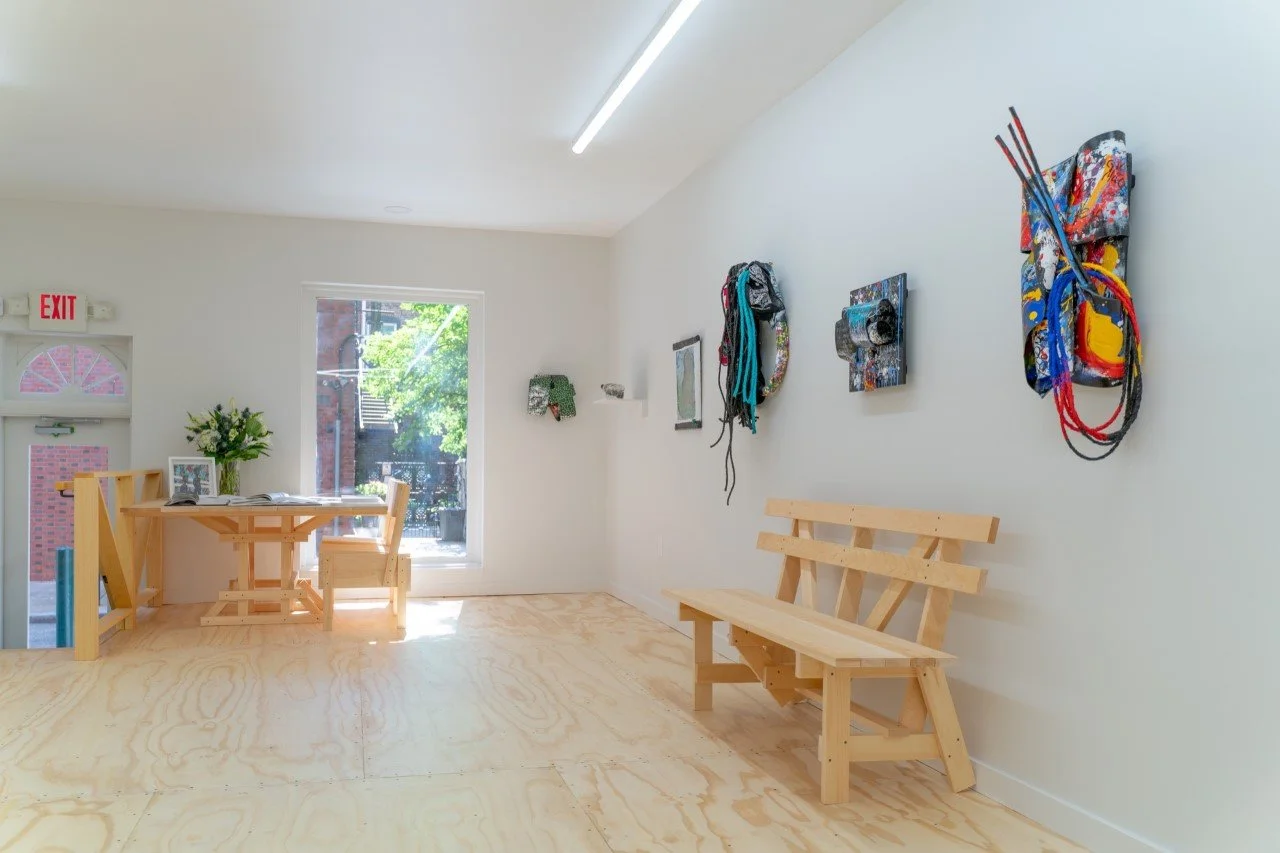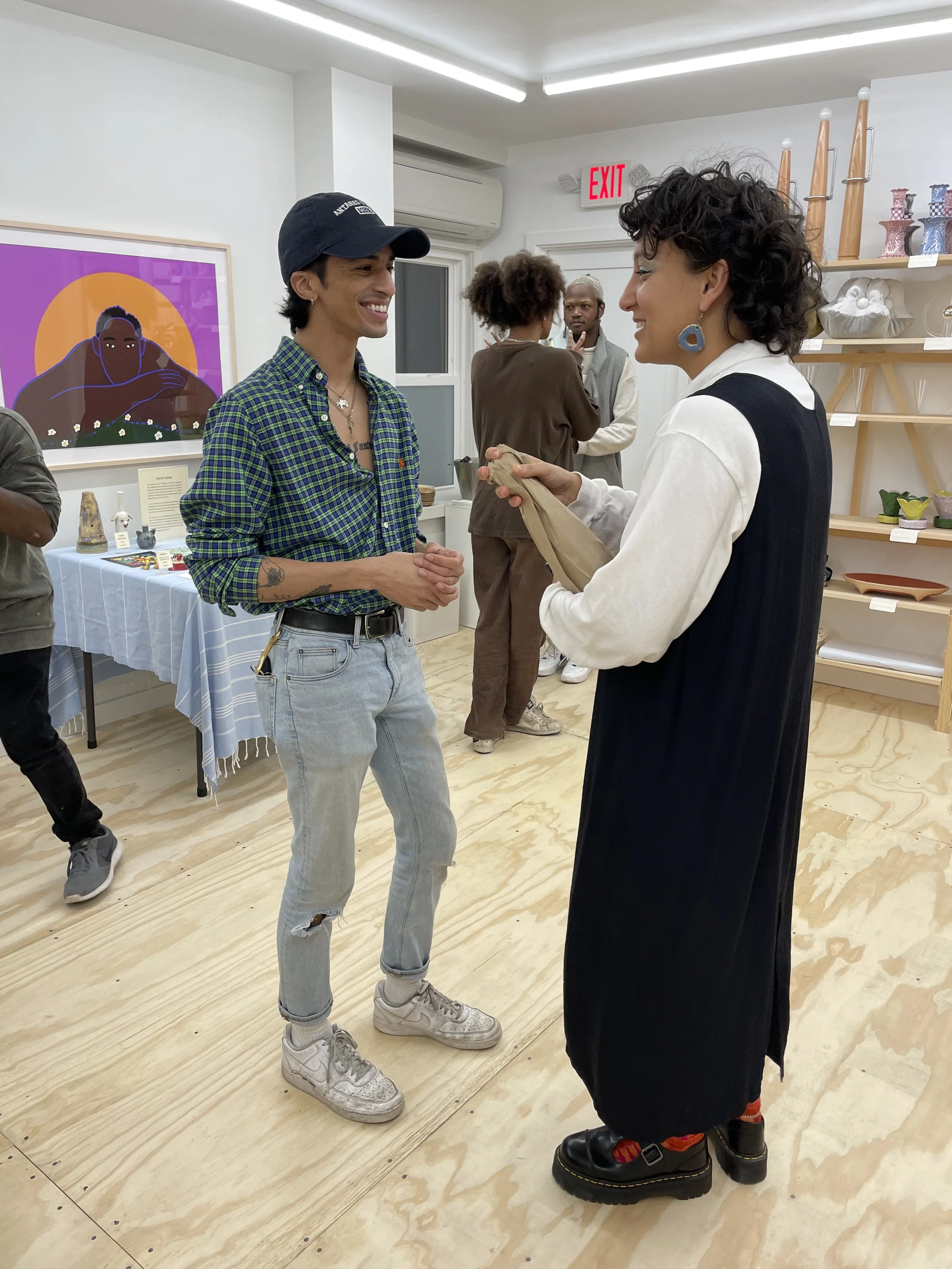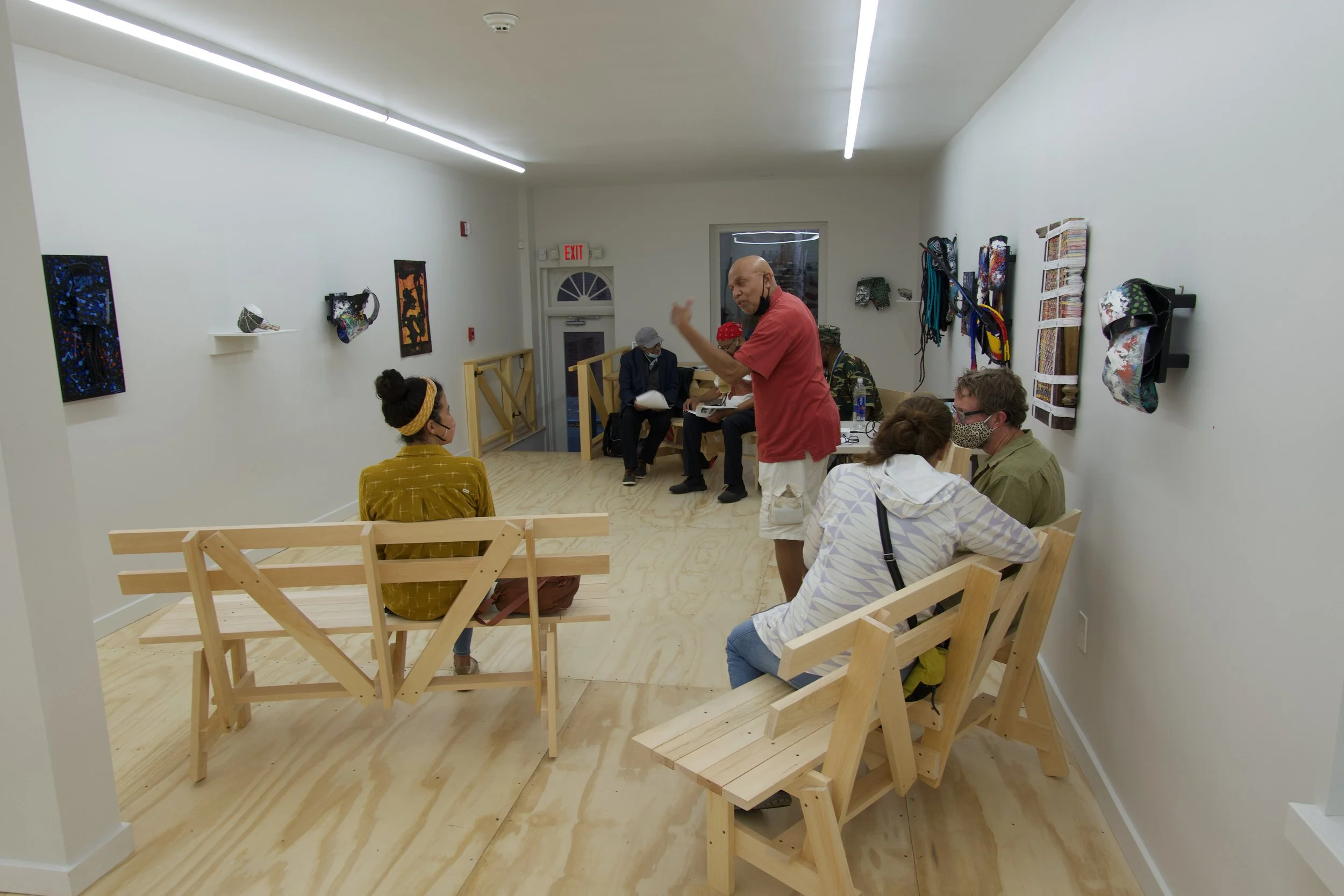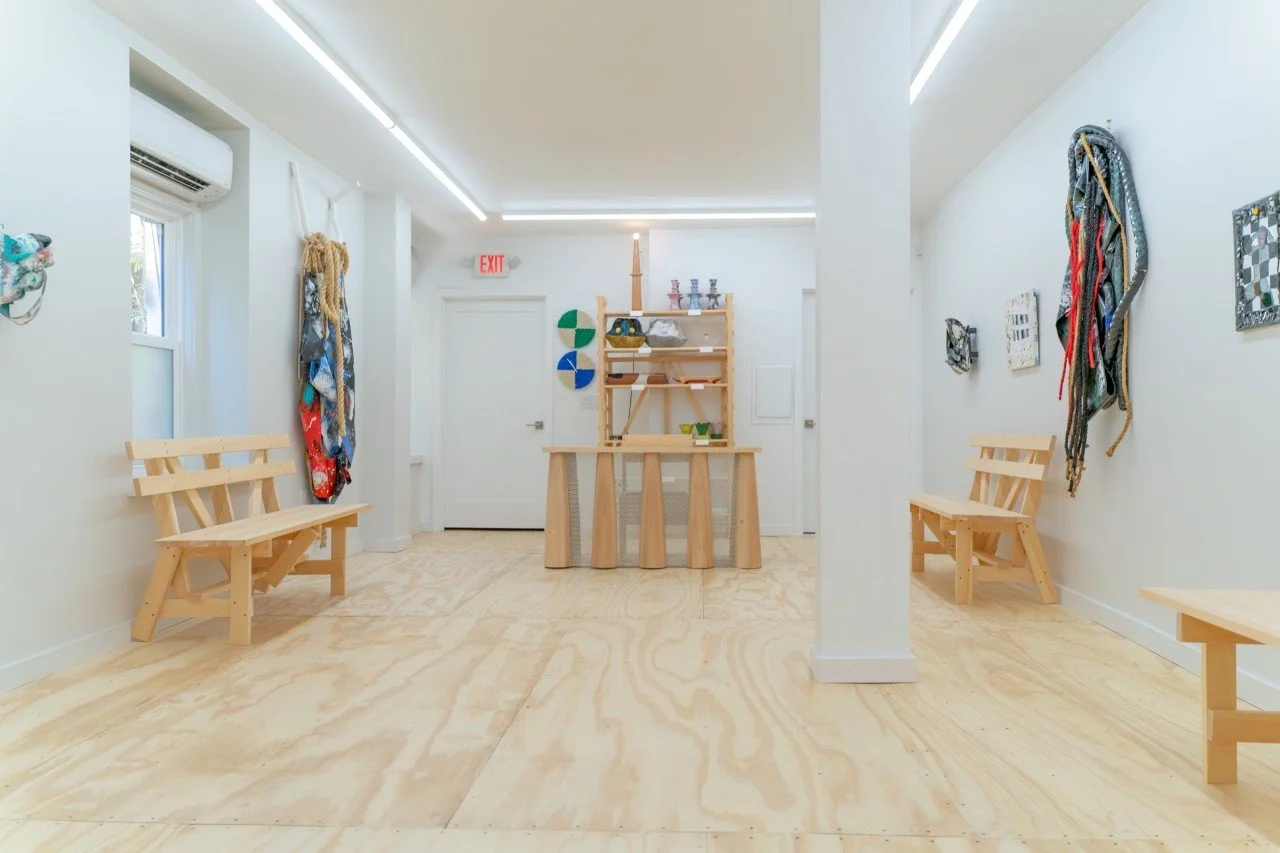Gallery exterior. All photos courtesy of Commonweal.
Commonweal
Commonweal exhibits emerging and mid-career artists and designers from the Philadelphia community whose work actively engages with local, national and global conversations. Commonweal hosts nine two-person exhibitions throughout the year and features a design capsule collection, which rotates annually, of ten unique objects exclusive to the gallery. Monthly, they offer a series of intimate programs intended to broaden an appreciation of how and why featured makers engage the world.
Gallery interior.
Interview with Commonweal Founder Alex Conner
Questions by Megan Galardi
Can you tell us about how Commonweal got started? What prompted you to create this space?
About five years ago I started a group called Philly Stewards. Philly Stewards is dedicated to the collection, support, and promotion of Philadelphia art and artists. What we've morphed into over the intervening years is basically an organization that centralizes a lot of information about the Philadelphia art scene—everything from a printed gallery map to a weekly listing email that goes out to about 3,000 people. When you google Philly art collecting, we inevitably come up due to our mission. We began to get a lot of questions on subjects such as, “Where can we see Philadelphia artists?” and, “How does making a purchase at a gallery work?” Having been involved in the arts in a variety of capacities for many years, this interest clued me in to the fact that there was developing an interested community that not only wants entree in to the conversations being had by contemporary voices in Philly’s art scene, but is also willing to buy in as collectors. I realized that a gallerist coming down from New York or diagonally from Chicago, who was able to do the very basic things—having Philadelphia artists, being able to do a sale, and having all the hallmarks of a classic, professional commercial gallery—would beat out everybody else in the scene pretty quickly. I came to the conclusion that this would be my next step, combining my experiences in business, the arts, education, and gallery management. But, it had to be an interpretation of a commercial space that would bend to Philly, and not the other way around.
Guests connecting at a Commonweal gathering.
Is Commonweal your first curatorial project or have you been involved with running other spaces in the past?
Not by far. I’ve curated exhibitions at commercial, artist-run and not-for-profit spaces over the years. However, I don’t take on the professional mantle of curator. I view myself as a gallerist. My job is to build Philadelphia artists a collector base in Philadelphia, which we can then use to stabilize their career and grow them outside of the city. I want to carry these passionate and thoughtful voices to other places. I worked at a gallery in Holmdel, New Jersey during college called James Yarosh Associates, which was very specialized in the work it showed. The owner, James, is still a lifelong friend and introduced me to so much about gallery management, especially working with collectors and building collections. I try to take those lessons and always be sincere, kind and be firm. Art is a qualitative field. A larger painting isn’t necessarily better than a smaller one. I’ve spent 15 years studying, reading, seeing and learning about the global history of art, to develop an eye for quality, and discovering quality is as key as being able to convey it to others. If I must, the one thing I have to admit to is curating my collection at home. I've spent the past decade purchasing and building contemporary Philadelphia artworks (along with other odds and ends) into an eclectic collection. Every collector should buy the things they love and, for me, that’s artworks by the strongest and most compelling voices who reflect something essential about this city.
Guests connecting at a Commonweal gathering.
What do you think sets Commonweal apart from other galleries or exhibition spaces in Philadelphia?
Commonweal operates in a niche that I feel other spaces haven’t occupied for quite some time. What I was interested in creating was a space for emerging and mid-career Philadelphia artists who, I believe, are engaging in diverse and rich conversations that touch on themes present in national, maybe even global, issues. Finding those voices, discovering two artists whose works are materially, conceptually or aesthetically sympathetic to one another, says to me that they're both pulling something out of the cultural conversation that’s important. They’ve both grasped on to something poignant and are using their creativity as a lens to reflect that subject back to their audience, in an attempt to cause them to pause and think about it. I really do believe that to be an artist is a job, just like a florist, a doctor or a school bus driver. And the job of the artist is to create, if only for a moment, a suspension of disbelief in their works’ audience, which places them in a space of reflection. My job as a gallerist is to help the professional artist gain stability by offering them the trappings of legitimacy in our profession—a commercial context and the permission to follow their vision - to allow collectors to come and see their work in its best circumstances.
Commonweal hosts various events and programs each month in addition to the exhibitions. Can you tell us more about this?
Artists are multimodal people who aren't just the objects they have created. Just like anyone, there are many intersecting aspects of their personalities and a diverse range of worlds that they travel through, which inform how they choose to reflect their interests in the world back on to it. I wanted to share that with the public. I wanted to give artists permission to show off their facets and perhaps offer another point of entry into their work for an audience. The gallery hosts multiple events each month designed by the artists. What I've asked them to do is really go wide with it—the only prohibition I've given them is no artist talks. I recommend that they develop an event that they would want to go to because that's what will really entice visitors to want to come and engage with themselves and, hopefully, their work. One of the three core principles for Commonweal is “a gallery is a place where you should enjoy yourself.” It was important to me to give artists that space. As someone who worked in K-12 Arts Education for many years, it’s also important to incorporate youth education into the gallery as well. I work with each artist to design and run a free young artist workshop on a Saturday morning during the run of their exhibition. Kids are the future.
Guests connecting at a Commonweal gathering.
What kinds of artwork and artists are you interested in showing in the future? Are there any Philadelphia artists you are particularly excited about?
I’ve started this month (February) putting together ideas about next year’s roster of exhibitions and, as such, I don’t know if I feel particularly comfortable sharing names. All the shows will continue to focus on object-based work. Some themes I’m thinking that I might want to explore are the disembodied body, color as a political strategy and the negotiation of generational identity. I’m looking for artworks that unfold - not simply one-liners. I think that’s the most satisfying art and, as a collector myself, the best kind to live with. It was incredibly difficult to choose the first year’s artists for the gallery, and I think ‘22-’23 will be no different. There are so many people creating such incredible artworks. We are so lucky to be living in such an artful city.
Is there any advice you would give to fellow creative planning to start a new exhibition space or gallery?
Patience has proven to be very important, especially in this time of COVID. Everything took longer than I would have liked. Working with the city government for things like licenses, inspection, permits—all the bureaucratic minutiae—was an abrasive process. I also took a while to find the space and easily looked at twenty before the one I went with on Latimer Street. Teaming up with a couple of designers and a construction company I liked, who could work with me to make the space in my mind become a reality, also took its time. My advice to anyone with a similar vision is to know specifically why you're doing this particular thing—creating an art space. Be intentional and use that as the core around which you pivot. For myself, it has always been about getting Philadelphia art and artists out there. Everything about the space from its design, to its programming, to PR—it's all about wanting to lift up their vision and the vision of our terrific city. Getting Commonweal off the ground is the most difficult thing I’ve done in my life, but it was worth it. I mean, what else could I do?
To find out more about Commonweal check them out on Instagram or on their website.
Gallery interior.






